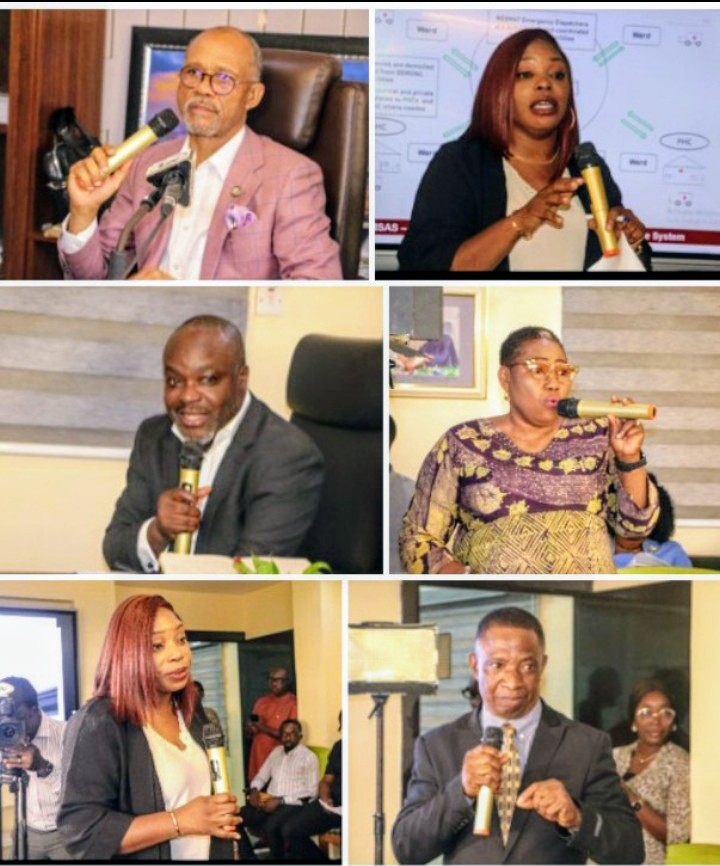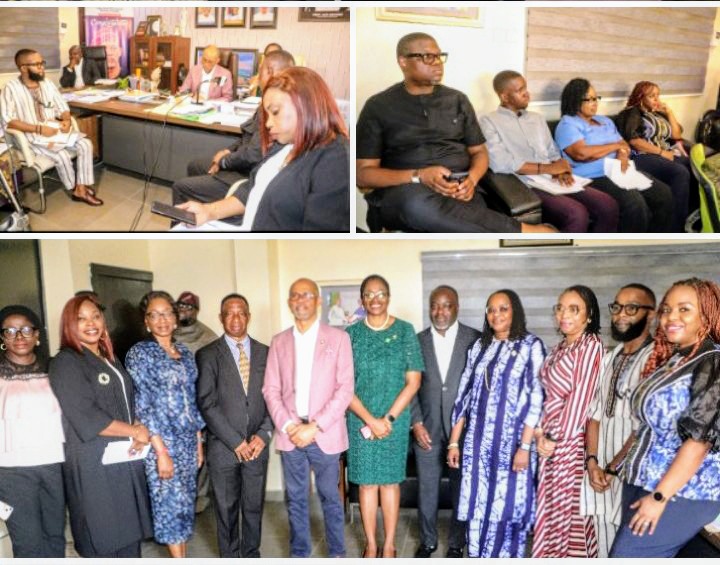….Collaboration Focuses on Strengthening Emergency Services and Healthcare Reach
...Call for Improved Emergency Services in Lagos’ Rural Areas Intensifies
By Kehinde KOLAWOLE

In a strategic move to address maternal mortality and enhance emergency healthcare access in Lagos’ underserved and remote regions, the Ministry of Health has partnered with the National Emergency Medical Service and Ambulance System (NEMSAS) to launch the Rural Emergency Services and Maternal Transportation (RESMAT) programme. Funded by the World Bank, this initiative aims to bridge the critical healthcare gaps in rural communities, offering vital medical services and timely transportation to save both maternal and infant lives. By improving emergency response in hard-to-reach areas, RESMAT is set to revolutionize the healthcare landscape, ensuring that no life is left at risk due to inaccessibility
In a press statement signed by the Director, Public Affairs , Tunbosun Ogunbanwo, it states that during a key advocacy and stakeholders’ engagement meeting, Dr. Prosper Ahworegba, the NEMSAS team lead and Resource Person, highlighted the vital role of the REMSAT programme in advancing emergency healthcare and maternal transportation across Lagos State. Alongside him, Mrs. Joke Dada, NEMSAS Claim Officer, and Mr. Williams Gerlong, an External Consultant, shared insights into the program’s goals. They emphasized that the purpose of the meeting was to promote a deeper understanding of the Rural Emergency Services and Maternal Transportation (RESMAT) initiative while encouraging collaboration to strengthen emergency medical services in rural Lagos. The team’s visit underscored their commitment to improving healthcare access in underserved areas.
Dr. Ahworegba delivered an insightful briefing on the RESMAT initiative, highlighting its crucial role in tackling the significant disparities in maternal and child health. He emphasized the urgency of addressing the high mortality rates, especially in rural areas, where access to timely medical care remains a challenge. RESMAT, he explained, is designed to create a sustainable emergency medical transport system that will ensure pregnant women and vulnerable groups in underserved communities receive the immediate care they need, ultimately saving lives and reducing preventable deaths.
Dr. Ahworegba emphasized that the advocacy visit spotlighted the critical need for rural emergency medical services (EMS) as a key component of Nigeria’s commitment to achieving Sustainable Development Goal 3—ensuring good health and well-being for all. He pointed out that the absence of robust EMS infrastructure and reliable transportation in rural areas significantly worsens maternal mortality and overall health risks. In this context, the RESMAT initiative, supported by President Bola Ahmed Tinubu’s administration, is crucial for bridging these gaps, playing a pivotal role in Nigeria’s pursuit of universal health coverage and improved health outcomes for vulnerable populations.
Dr. Ahworegba outlined the RESMAT initiative’s comprehensive six-pillar model, designed to build a resilient emergency medical services (EMS) framework for rural communities. The pillars—governance, advocacy, quality monitoring, dispatch systems, skills development, and financing—form the backbone of this transformative plan. He shared that Lagos is one of 15 states receiving World Bank support for the program, which is set to improve healthcare access significantly. By December 2025, the initiative is expected to benefit 1.7 million pregnant women in Lagos, strengthening the region’s EMS infrastructure and saving countless lives.
Dr. Ahworegba also introduced RESMAT’s innovative three-stage operations model, which utilizes local resources such as tricycles and boat ambulances to swiftly respond to maternity emergencies. He emphasized how this community-driven transport system not only ensures timely access to life-saving care but also empowers rural populations to take charge of their health during critical moments, bridging gaps in emergency medical services where conventional transportation options are scarce.
NEMSAS has devised a comprehensive four-step strategy to advocate for and drive behavioral change in emergency care, focusing on engaging community leaders to build support for emergency services. A core aspect of this plan involves training frontline health workers and local first responders through vital programs like Basic Emergency Care (BEC) and Community First Aid Response (CFAR), equipping them with essential life-saving skills.

In response, Dr. (Mrs.) Kemi Ogunyemi, Special Adviser to the Lagos State Governor on Health, praised NEMSAS for its initiative, noting its strong alignment with Lagos State’s commitment to reducing maternal and infant mortality. She acknowledged the significant challenges posed by rapid population growth, increasing healthcare demand, and the transportation hurdles in riverine and rural communities, underscoring the importance of this initiative in overcoming these barriers.
Dr. Ogunyemi expressed confidence that Lagos’s partnership with NEMSAS would be instrumental in achieving the state’s ambitious healthcare objectives, praising Governor Babajide Sanwo-Olu’s unwavering commitment to healthcare innovation. She reaffirmed that expanding healthcare access is a top priority, with the state making strides through the expansion of primary healthcare facilities and the provision of free antenatal and delivery services.
She also highlighted Lagos State’s focus on improving emergency response routes, citing the recent addition of five new ambulances donated by the Global Fund to strengthen LASAMBUS, the state’s ambulance service. These efforts underscore the state’s dedication to enhancing emergency medical services and improving health outcomes for its residents.
She emphasized that collaboration with the private sector, which serves approximately 60% of Lagos residents, is vital for ensuring comprehensive emergency medical services (EMS) coverage. She also expressed her gratitude for the invaluable support of the Bill & Melinda Gates Foundation, whose contributions have been pivotal in enhancing healthcare services and improving critical infrastructure across the state.
In his address, Prof. Akin Abayomi, the Commissioner for Health, underscored the significance of resilient infrastructure, pointing out that several LASAMBUS stations have been upgraded to permanent structures to ensure the continuity of emergency services. He emphasized that these durable facilities are essential for maintaining seamless and reliable care.

Prof. Abayomi also stressed the need for enhanced communication in emergency medical responses, particularly in ensuring precise ambulance dispatch. To further improve coordination, he revealed plans for the launch of the Lagos State Smart Health Information Platform, a new initiative designed to integrate public health facilities and streamline emergency operations across the state, even in its most remote regions.
A key focus of Prof. Akin Abayomi’s remarks was the enhancement of communication systems in emergency response. He emphasized that swift and accurate ambulance dispatch is crucial to avoid situations where well-meaning but untrained Good Samaritans intervene, potentially causing harm. “To tackle these challenges, Lagos State is investing in an advanced emergency response system that integrates ambulances, police, and fire services for a coordinated, unified approach,” he explained.
Prof. Abayomi also highlighted the expansion of emergency services into riverine communities, a demographic often overlooked in emergency planning. In collaboration with the Lagos State Waterways Authority (LASWA), the state has launched water ambulances to provide critical care to areas that can only be reached by water, ensuring that even the most remote communities receive timely assistance.
Prof. Akin Abayomi discussed the decentralization of primary healthcare, noting the appointment of experienced administrators to oversee health districts across Lagos. This move reflects the government’s commitment to improving access to healthcare, particularly in rural areas, with a focus on enhancing maternal and child health services.
More importantly, the Commissioner acknowledged the challenge of bridging traditional and modern healthcare practices. He emphasized the importance of a strong governance and advocacy framework to encourage rural mothers, who often face significant barriers, to seek medical care far from home, highlighting the difficulty for families deeply rooted in tight-knit community networks.
Dr. Olusegun Ogboye, the Permanent Secretary of the Lagos State Ministry of Health, echoed the sentiments of Prof. Abayomi and Dr. Ogunyemi, emphasizing the vital role of partnerships like RESMAT in ensuring sustainable healthcare access. He highlighted the Ministry’s collaboration with local governments to strategically cluster primary healthcare centers around secondary facilities, improving resource distribution and enhancing emergency response efficiency.
Dr. Ogboye also raised concerns about the multifaceted nature of emergency response, pointing out that addressing one delay—such as transportation—is insufficient if other delays persist, particularly within hospitals. He called for a holistic approach to tackling the three main bottlenecks: decision-making, transport, and hospital readiness.
Similarly, Dr. Ogboye proposed integrating the NEMSAS RESMAT dispatch system into existing emergency frameworks. He suggested that dispatch centers incorporate specialized representatives, particularly for maternal emergencies, to ensure rapid and precise response coordination.
Dr. Ogboye further emphasized the importance of integrating emergency services with community health initiatives, particularly the Community Health Influencers, Promoters, and Services (CHIPS) program. He proposed that training within the emergency response system be extended to CHIPS personnel, enabling them to provide basic emergency care in remote areas where access to professional healthcare is limited.
He also highlighted the role of health insurance in ensuring the sustainability of emergency services. He stressed the need for critical care, especially in emergencies, to be included under health insurance coverage, ensuring long-term financial support and wider accessibility to these essential services
Building on the discussion, Mrs. Joke Dada, Claims Officer for NEMSAS, highlighted the importance of adapting emergency services to the unique urban and rural landscapes of Lagos. She stressed the need for thorough needs assessments and targeted funding to address the city’s specific challenges, ensuring that emergency services are tailored to its diverse environments.
Mrs. Wuraola Makinde, Director of LASAMBUS, provided a detailed overview of the service’s progress and the operational challenges it faces. She outlined recent improvements, including upgrades to ambulance designs and the recruitment of trained personnel. These advancements, supported by both state and donor funding, have significantly enhanced the quality and reliability of LASAMBUS services, strengthening Lagos’s emergency response capacity.
The meeting wrapped up with a renewed commitment from all stakeholders to propel the RESMAT program forward, with a firm promise that Lagos will support 1.7 million pregnant women by 2025. This ambitious goal highlights the state’s determination to guarantee that all residents, regardless of their location, have access to life-saving healthcare, reinforcing Lagos’s commitment to improving health outcomes for its people.









